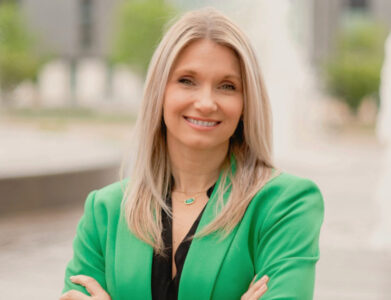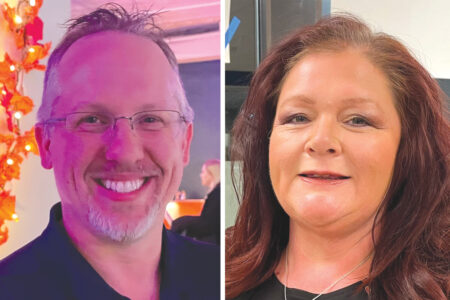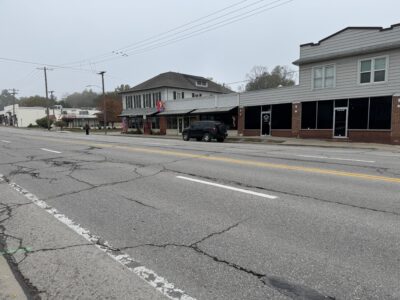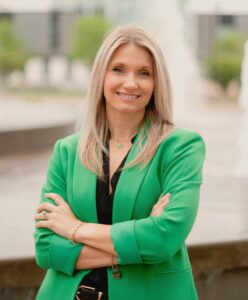Incoming economic development leader is ready to learn more about Lawrence’s ‘shared vision’

photo by: City of Lawrence
Susie Carson, incoming economic development director for the City of Lawrence.
While talking about Lawrence’s small businesses this past week, Susie Carson made it clear that she thinks the city is special.
“In Lawrence, you guys’ culture -” she said, and then rephrased it: “Our culture! I’m excited to say that.”
“Just the identity and the culture of the small businesses, I think it’s one of the things that makes Lawrence, just, what it is,” she went on. “Just infectious, in a good way. It makes you want to be there.”
Soon, she will be there to guide the business development efforts of a city in transition. The City of Lawrence announced earlier this week that Carson had been hired as its new economic development director, a position that had been vacant since the departure of previous director Britt Crum-Cano last year.
Carson, who has more than 15 years of economic development experience, is currently an executive in the Olathe Chamber of Commerce and before that was the executive director of the El Dorado chamber. She won’t start her new role until Jan. 5, but she said she’s eager to get started learning more about the community — its image, its strengths and where its opportunities and challenges are.
The Journal-World talked with Carson this past week about those things, and also about the city’s changing leadership; the FIFA World Cup; and the impact a good explanation can make.
First impressions
As of right now, Carson said she can’t really say how business-friendly Lawrence is. “I’m not there to actually experience that yet,” she said.
But she has been doing some research, and she intends to do a lot more when she starts her new job.
Based on metrics she’s seen so far on the city’s website, she said, “I see that there might be some opportunities to improve communication and maybe the timeline of some of the projects and predictability of it.”
“But I would really love to get in there and do a listening tour with partners – all community partners, from businesses to the Chamber to KU, and kind of find out what their perception is.”
Once she has a better idea of Lawrence’s reputation as a place for business, she said, that’s when she can “work on that perception, wherever it stands, and continue to either, if it’s high, maintain it, or continue to help it grow.”
There are some strengths in Lawrence that Carson can point to right away. One of them is the community’s support for its small businesses.
“I think small businesses are the backbone of every community,” she said. “… They’re absolutely essential, and I want them to feel supported and heard.”
Carson mentioned the fact that Lawrence is a NetWork Kansas E-Community, too. This is a program that she’s familiar with from her time in El Dorado, and it can provide gap financing for entrepreneurs who need some help getting their businesses off the ground.
She also thinks Lawrence’s pool of workers is a strength. At least in her experience in Olathe, “workforce is one of the top three things that we hear when we talk to businesses” about their challenges, and Lawrence seems to be in a good spot, she said.
“Lawrence has a highly educated, talented workforce, and I think that’s absolutely amazing,” Carson said.
Obstacles to business
But being an economic development leader isn’t just about touting a community’s strengths. It’s also about realizing the obstacles businesses face and finding ways to help.
Here, Carson said, it’s important to be proactive.
“Businesses shouldn’t have to hunt for support,” she said. “They should feel like we are a partner with them.”
That means listening when businesses say there are obstacles that prevent them from thriving.
She mentioned some challenges that businesses in general might struggle with, in her experience. Some are things that everyone feels — traffic, parking, inflation. “Inflation is a conversation definitely going on right now with businesses,” she said.
But others have more to do with cities and their regulatory processes “that are maybe a little too rigorous or elaborate.”
That was a talking point in Lawrence’s recent City Commission elections. Some of the candidates had concerns about whether the city’s regulations and policies were making development more difficult, and Kristine Polian, one of the two winners, specifically said that she would focus on removing “roadblocks” to development.
One thing Carson stressed is that cities need to be transparent with things like incentives, so that businesses know exactly what’s expected and what they’re getting.
“I think any incentive package or any time you’re talking to businesses about opportunities where there’s public-private partnerships, I think they have to be transparent, fair, predictable,” she said.
City governments shouldn’t be “picking and choosing winners,” she said. Rather, they should follow their policies and their “overall vision and strategic plan,” and then ensure that “everyone understands the rules that are within the policy.”
Sometimes, getting people to understand better is a matter of communicating better. When dealing with local government, Carson said, some business owners may not know what the process looks like or what to do next.
“A lot of times it’s just being a contact person to help them go through that process,” she said. They may need help getting an application, or they may need someone to help them understand which city departments they need to talk to and what information they need to provide.
“If we can just work with our businesses and ask what barriers they face, and then (figure) out how we can help streamline that process or connect them with the appropriate partner or resources,” Carson said, those problems are a lot less daunting.
Recently, she said, she was working with a business in Olathe that was getting an industrial revenue bond incentive, and just sitting down with the businessperson and explaining the process made that experience much better.
“He was like, ‘Help me walk through this process.’ Absolutely, would love to,” Carson said. “I understand that you run this kind of business and this is your day-to-day life. Let’s sit down and let’s have a cup of coffee and talk about it.”
The World Cup’s two sides
One of the biggest events for businesses in the coming year is the FIFA World Cup, and Carson made it clear that it’s a challenge, not just a boon.
“Let me be very transparent that I understand that there are two sides to this coin,” Carson said.
One side is that hosting guests from other parts of the world “puts us on a world stage,” she said. “I think it gives us the opportunity to show what a great, awesome region and city we are, and I think we can live up to our name.”
But, in order to do that, the city and local businesses will have to contend with many factors they’ve never had to deal with before.
It goes way beyond just handling the crowds. Some of the concerns are about how stores will serve an influx of customers who don’t necessarily shop in the same way Americans do.
“Do they use credit cards?” she asked. “Credit cards aren’t — depending on what country we get — aren’t as utilized as Americans utilize them.”
Or, she said, people might be coming from a culture that eats meals later than Americans do, and businesses might have to adjust their hours. In her current role in Olathe, she’d spoken with Sysco, a company that supplies restaurants throughout the region, about the challenges that restaurants will have to navigate.
“How do they order?” she said of restaurant owners. “What’s that going to look like?”
Not only businesses, but also residents will need economic leaders to answer their questions about the World Cup, she said.
“A lot of people are like, ‘hey, X amount of visitors are going to be here; what does this mean for us?'” Carson said. “What does this mean for security, safety, infrastructure, planning?”
“Just being able to showcase our town and our community and our culture, our American culture and identity,” she said, is going to be a highlight. But at the same time, “the challenges (are) a big conversation right now too, helping the businesses feel prepared.”
“So I think there’s a lot to work through,” she said. And in the Olathe chamber of commerce, which also encompasses Olathe’s convention and visitors bureau, “we’re absolutely having those conversations with our businesses.”
A ‘shared vision’
Carson’s previous two stops were both chambers of commerce, not local governments. But she said her position in Olathe has involved “a great working relationship” with the city, school district and higher education institutions.
“I believe that collaboration and just strong relationships are the foundation of any shared vision within a community,” she said. That foundation was strong for her in Olathe, she said, and “I hope to see that continue in Lawrence.”
Whatever happens, the fact is that the city government she’ll be working for will look different than the one that hired her.
City Manager Craig Owens is leaving his role midway through next year, as the Journal-World reported. And two of Lawrence’s current city commissioners, Lisa Larsen and Bart Littlejohn, will be replaced by Mike Courtney and Polian.
The Journal-World asked Carson what she thought about joining the city government at a time of so much transition. She said that the important thing to focus on was that “shared vision” of the community.
“It’s our job to work with whoever the residents and the city elect, and to work with them to help our community and the elected officials they chose to represent (them) bring their vision to light,” she said. “Whoever’s in that position, and whoever the city had confidence in and residents voted on, that’s our job to work in there, because that’s the shared vision and the voice.”
That will come back, again, to listening to the city’s leaders, listening to the public and using that to chart a course forward, she said.
“I’ve had the opportunity to work with elected officials for years,” Carson said. “And most elected officials, I feel, are doing it for a positive reason, to make a positive impact, with good intentions.
“Listening to them and listening to their stories, I think, is important.”






